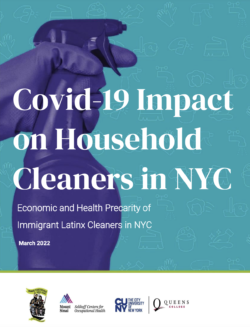 Executive Summary
Executive Summary
In this report, we present data from a survey of household cleaners in NYC and Westchester conducted between March 2021 and June 2021. As part of the Safe and Just Cleaners research project, we explored our study participants’ rates of Covid-19 cases, the economic and social impact of the pandemic and longitudinal changes in mental and physical health outcomes.
Household cleaners face financial insecurity due to loss of job opportunities during the pandemic (80% of them reported a reduction in income), lack of health coverage, precarious working conditions, immigration barriers, stigma related to having Covid-19 while feeling afraid to release their covid-19 status. All these factors are associated with the significant increase in their stress and depression levels. Key Findings:
- At least 54% of cleaners had Covid-19 during the first year of the pandemic, a rate much higher than the general population.
- Many cleaners knew somebody that had Covid-19 and over half of them knew someone that died of Covid-19 which impacted their mental health.
- Many household cleaners were not eligible or could not take paid sick leave during the pandemic.
- The pandemic exacerbated the housing, food, and financial insecurity among household cleaners.
- Most cleaners had a positive attitude towards vaccination.
- Due to the rise in demand for use of disinfectants, household cleaners increased the use of disinfectants at their workplaces, and in their own homes.
- Cleaners rely on community-based organizations as sources for information about Covid-19 updates, and of non-government assistance.
- Levels of depression, stress, and perceived fair/poor health increased among cleaners due to the pandemic.
